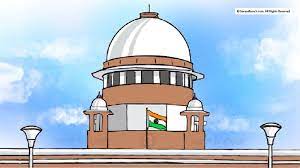By the impugned judgment and order, the High Court held that the respondent Nos. 1 to 5 therein (appellants herein and the State of Rajasthan) are bound to purchase a total of 906 MW electricity from the successful bidders. It, therefore, directed the writ petitioner- MB Power (respondent No.1 herein) and respondent No.7 – PTC India Ltd. (hereinafter referred to as “PTC India”) in the said writ petition (respondent No.2 in the present appeals) to supply 200 MW electricity to the respondents therein (appellants herein) within the limit of 906 MW. It also directed the writ petitioner- MB Power and PTC India, respondent No.7 in the said writ petition, to file an appropriate application before the respondent Nos. 1 to 5 in the said writ petition, within two weeks from the date of the order, complying with the necessary requisite conditions, including bank guarantee etc., as required in terms of the Request for Proposal (hereinafter referred to as “the RFP”). It further directed the respondent Nos. 1 to 5 in the said writ petition, for issuance of Letter of Intent (“LoI” for short) in respect of bid filed through PTC India for supplying 200 MW power from the power generating station of the writ petitioner i.e. MB Power at levelized tariff of Rs.5.517/Kwh, being in terms of their bid qualified by the Bid Evaluation Committee (“BEC” for short) and ranked L-7. It further directed the respondents No.1 to 5 in the said writ petition, to immediately within two weeks thereafter, execute the Power Purchase Agreement (“PPA” for short) with PTC India for procuring 200 MW power from the power generating station of MB Power, and then to start procuring power in accordance with law. As an interim measure, it directed that the tariff to be actually paid by the procurer-respondents before it, shall be the interim tariff i.e. Rs.2.88 per unit, as specified by this Court in its interim order dated 28th September 2020, passed in I.A. No.83693 of 2020 in Civil Appeal No.2721 of 2020. It further held that the final adoption of tariff to be paid to PTC India (respondent No.7 before it) under the PPA shall be subject to the final outcome of the said Civil Appeal No. 2721 of 2020, pending before this Court. (Para 1)
In the present case, the decision-making process, as adopted by the BEC was totally in conformity with the principles laid down by this Court from time to time. The BEC after considering the competitive rates offered in the bidding process in various States came to a conclusion that the rates quoted by SKS Power (L-5 bidder) were not market aligned. The said decision has been approved by the State Commission. Since the decision-making process adopted by the BEC, which has been approved by the State Commission, was in accordance with the law laid down by this Court, the same ought not to have been interfered with by the learned APTEL. (Para 104)
In any case, the High Court, by the impugned judgment and order, could not have issued a mandamus to the instrumentalities of the State to enter into a contract, which was totally harmful to the public interest. Inasmuch as, if the power/electricity is to be procured by the procurers at the rates quoted by the respondent No.1-MB Power, which is even higher than the rates quoted by the SKS Power (L-5 bidder), then the State would have been required to bear financial burden in thousands of crore rupees, which would have, in turn, passed on to the consumers. As such, we are of the considered view that the mandamus issued by the Court is issued by failing to take into consideration the larger consumers’ interest and the consequential public interest. (Para 105)
SUPREME COURT OF INDIA
2024 STPL(Web) 23 SC
[2024 INSC 23]
Jaipur Vidyut Vitran Nigam Ltd. & Ors Vs. Mb Power (Madhya Pradesh) Limited & Ors
Civil Appeal No.6503 OF 2022 With Civil Appeal No.6502 OF 2022 CIVIL APPEAL NO. 4612 OF 2023-Decided on 08-01-2024.
https://stpllaw.in/wp-content/uploads/2024/01/2024-STPLWeb-23-SC.pdf







